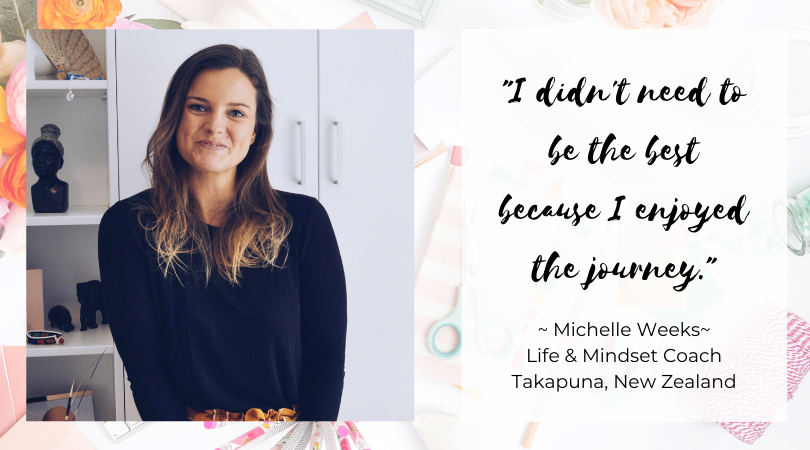Overcoming Perfectionism: Eight Women on Life-Changing Perfectionist Shifts
If you’ve ever struggled with overcoming perfectionism, you’re in good company. We are a sisterhood of people-pleasers, relentless goal-getters and critical Cathys…or at least we used to be. The great news is that overcoming perfectionism is a real thing. It may happen over time or all at once or maybe not at all, but you can make small mindset shifts that make a big difference.
Your perfectionism story might look completely different from mine or someone else’s, but there’s always something to be learned from another’s experience. In hopes of beginning and furthering the process of overcoming perfectionism, I’ve joined with EIGHT women around the world to share some of the biggest mindset shifts we’ve made that completely altered the way we think and feel perfectionism. Not all of these ideas will fit for you, but one or more might lead to your next big leap! Without further ado…

“You don’t have to be perfect to inspire others! Let them be inspired by the way you deal with your struggles, your heartaches and your imperfections. We walk around so carefully, tiptoeing past issues, allowing the opinion of others to shrink down our ambitions. In short, we slowly murder ourselves in our quest for so-called perfection. I stand by the idea that you DO NOT have to be perfect to be exceptional, and you certainly don’t have to be a saint to inspire others! I think it’s crazy that we hold ourselves back from taking action because we think we have to be perfect first and we think we need all the answers! Together let’s stop striving for perfection in an imperfect world. Let’s stop waiting for the “perfect time”. Let’s embrace our mistakes, learn from them and allow them to create a better you! And that’s inspiring!” Learn more about Jem here.

“I long believed that perfectionism is good. What could be better than a perfectly executed job and or perfect score on an exam? At work in Australia my manager said, ‘Stop doing so much. This is already excellent work at just 80% completion.’ It was completely incomprehensible to me. In my free time, I could sit for hours over the presentation, only to make all the slides look exactly 150%. They appreciated it, yes, but was it really so critical? No. Perfectionism is the desire for an unattainable result and the belief that this result can be achieved. The perfectionist’s problem is that there is no limit to perfection. The perfectionist does not know when to stop and remains dissatisfied even with the praise of everyone else. I am changing my thinking to be ‘good is enough already’ because I want to be satisfied with the good result of my work, enjoy the process without all the exhaustion and convey healthy expectations to my children.” Learn more about Anna here.

“Letting go of being a perfectionist is a gift to yourself. This was the absolute biggest challenge for me, yet the most rewarding. Does this sound familiar to you? I use to set absolute ideals. There was only black and white, no grey. I had an all-or-nothing approach and feared failure because it suggested imperfection. I was my harshest critic and would beat myself up for the smallest things. Finally, I got sick of mulling and crying over outcomes if they did not turn out as envisioned. I realized I was being a perfectionist to prove to everyone that I AM WORTHY, not realizing that I am already worthy in many ways. I am perfectly imperfect. My journey is to strive for constant improvement. I am deemed worthy because I drive my goals forward. My passion fuels me. I lead with intention. When you embrace who you are, the impossible becomes possible!” Learn more about Amy here.

“I was recently challenged to coach a client on perfectionism that was so debilitating it was getting in the way of her everyday life. I asked her to practice being imperfect starting in the ways that matter least working up to the things that are more important. We both pretended she was a student in the School of Being Perfectly Imperfect. In this school, there are no grades, just a reward of bad poetry written by yours truly upon successful completion of being imperfect. It was our fun way of re-patterning a reward system in her that favored perfectionism since childhood. This is part of her first poetry reward: ‘Roses are red, this poem’s gonna suck. It’s fine. It’s imperfect. I don’t give a faak….I’m glad that you practiced, being imperfect in some ways. I think it’s important, to build new neural pathways. For you’re far too creative, for perfection to hold, the immensity of your being, does not fit into the perfection mold.’ In my work coaching leaders around their perfectionism, I find it’s often helpful to ask them what about their perfectionism is in service to them. It’s not about pushing it aside, per se, but about also seeing the virtues in it. I also ask them to think about what about their perfectionism is not in service to them. I’ve found a link sometimes between perfectionism and safety for my clients. Being perfect kept them safe from something early in life. This is a rich and important aspect of perfectionism to explore with clients that leads to deeper insights on the role perfectionism plays in their lives and work. Here’s to being free from the constructs you were taught in your life that now hold you back. Here’s to change, and to finding a better way. It is possible.” Learn more about Farhana here.
“I realized all of a sudden one day that I wasn’t a perfectionist anymore. In high school, you could call me ‘Ms. Overachiever’, a girl who would sob over any and every failure. I measured my worth completely on my achievements. It was motherhood that led to my big perspective shift. Morning sickness hit me hard and suddenly all my ambition was gone. It was startling. Who was I without ambition, goals or dreams? This experience put me into such a state of just being (instead of relentless doing and pleasing) that slowly my perfectionist mindset began to shift. One of the things I love about myself is that I’m always learning something new to make myself or my life a little bit better. I realized that at the root of perfectionism might just be the desire to improve. If you shift your view of perfectionism to be the incremental process of improving yourself instead of a futile effort to jump straight to perfect, you may find the pressure and shame disappear. When I’m working on challenging new projects, my motto of sorts is, ‘I don’t know exactly what I’m doing or what they want, but I’m going to do my best and that’s all I can do.’ If things don’t work out, I can always make changes and move on.” Learn more about Rachel here.
[mo-optin-form id=”yCwaYCjyJL”]
“I’ve learned 5 things as a recovering perfectionist. First, flawlessness is an illusion. Secondly, done is better than perfect, so go ahead and hit publish. It feels so good to check off that to-do list, doesn’t it? If you need to make improvements, you can edit later. Thirdly, Keep your eyes on your goal but enjoy the process. Don’t stress over the tiny possibility that your project might not be successful. Fourth, don’t wait for the ‘right’ moment. Got an awesome idea you’ve been endlessly fine-tuning? Take the first step toward implementing it. Lastly, don’t get caught up in the little details that have no impact on the big picture.” Learn more about May here.

“I was always the people-pleaser, the yes girl, the others-come-first girl. I identified so deeply with making other people happy, that I loosened the boundaries I needed in order to feel the same joy, self-compassion and kindness myself. In rectifying this, my first step was learning to say no. It was an incremental approach. First, buying myself time by saying ‘Could I get back to you about that?’ working my way through to ‘Thank you for the offer, but I won’t be able to make it’. Once I valued my own worth and could recognise how to embrace it, I was able to be selective about the things which added value to my life, which presented opportunities for me to learn, to connect and to feel imperfectly human. The result of this was a world where I felt brave and courageous, where I didn’t need to be the best because I appreciated and enjoyed the journey (shock horror!). I consciously implemented a growth mindset and experienced little yet consistent improvements which reminded me of the growth, rather than the destination.” Learn more about Michelle here.

“Perfection is a coping mechanism. When you don’t know how to deal with life’s challenges, it’s easy to look for ways to soothe yourself. Perfectionism makes you believe that if you score a perfect 10, somehow you will be exempted from life’s troubles or sorrows. Perfectionism makes you believe that if you get everything perfect, no one will hurt you or disappoint you or get mad at you. The reality is, it doesn’t always work that way. To be human is to feel emotions. One of the ways to overcome perfectionism is to be OK with your challenging emotions. In my experience, the more I acknowledge and accept my feelings as they are, the easier it is to overcome perfectionism. Remember, what makes you imperfect is also what makes you beautiful.” Learn more about Kiran here.
A big thank you to each of these incredible women who’ve shared their honest and authentic thoughts on overcoming perfectionism. What resonated with you? Share your insights in the comments below!









It’s reassuring that women all over the world have looked at perfectionism and said there’s a better way!